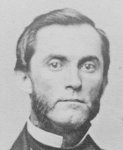 Open main menu
Open main menu
 Open main menu
Open main menu

W.J.H. White
(1827 - 1862)
Home State: District Of Columbia
Education: Columbian College (DC) Medical School, Class of 1849
Command Billet: Medical Director
Branch of Service: Medical
Unit: Sixth Army Corps
Before Antietam
He graduated from the Columbian College Medical School (now George Washington University) in 1849, passed the Army board, and probably worked as a civilian contract surgeon for the Army. He was nominated by President Zachary Taylor for a Regular Army commission in February 1850, and was appointed Assistant Surgeon, USA, on 12 March of that year. He served with the 2nd US Cavalry in Texas and New Mexico, then returned to Washington, DC in 1855 and passed the examination for promotion to Surgeon. After a short leave he returned to Texas and was there into 1860.
He was living with his parents James and Anna R. White in Washington DC at the 1860 US Census. In 1861 he was in charge of the General Hospital in the Washington Infirmary and a member of the Army Medical examining board. On 16 April 1862 a billet opened and he was appointed Surgeon and Major, USA. In May he was assigned as medical director of Franklin's new 6th Army Corps.
On the Campaign
On arriving about 10am on 17 September, he oversaw the establishment of the Corps field hospital on the Michael Miller farm and at Dunbar's Mills just north of the battlefield. He was killed by gunshot that afternoon at Antietam:The circumstances attending the death of Dr. WHITE are most singular. During the whole of the terrible battle of Wednesday Dr. WHITE was superintending the care and removal of the wounded from the battle; and it is supposed the excitement consequent to the occasion produced a species of temporary insanity, for after the battle had lulled somewhat, he rode up to Gen. FRANKLIN and said, "General, if you will give me a regiment of men I will clear those woods of rebels," pointing to a piece of woods on his right in which was stationed a very large force of rebels.
Gen. FRANKLIN replied, that fifty regiments would be unable to dislodge the enemy from the position, and that it would be useless to attempt the experiment. Dr. WHITE rejoined, "If you will not give me the men to take those woods, I will go and take them myself," at the same time proceeding in the direction of the place where the rebels were concealed, at a rapid gait. When within about twenty or thirty rods of the edge of the wood, he was fired upon by several rebel sharpshooters, two balls taking effect, one in the forehead and another in the breast, killing him instantly.
The man who killed him was afterwards taken prisoner, and professed to be very sorry upon learning that his victim was a surgeon instead of a Major, which he took him to be by his shoulder-straps.
The rest of the War
6th Corps commander Major General Franklin, in his Report of 7 Octobers, said only:
I regret to announce the death of Surgeon White, medical director of the corps, who was killed while we were examining the point of woods which we expected to attack. He had been attached to my staff, and his loss will be severely felt by the medical corps.In March 1863 Army of the Potomac Medical Director Jonathan Letterman wrote of him:
I have alluded to the loss of medical officers in battle. Two of them fell upon the battle-field of Antietam, whose devotion to duty I cannot pass over. Surg. W. J. H. White, U.S. Army, medical director of the Sixth Corps, under General Franklin, was killed on that field by a shot from the enemy. He, was a skillful surgeon, a gallant officer, and a gentleman whose deportment was kind and courteous to all who had intercourse with him. These admirable traits, together with his familiarity with the medical affairs of that corps, made his loss, and especially on that day, deeply to be deplored.
References & notes
Service information from Heitman1 and the Official Army Register. Details from the Historical Catalogue of the Officers and Graduates of the Columbian University (1891). 6th Corps hospital locations from the journal The Military Surgeon (1913). Some service details from a memorial of 20 September from US Army Surgeon-General Hammond published in the New York Times of 12 October 1862, source also of the extraordinary quote above. His photo here from a CDV in the collection of Drs. Michael Echols & Doug Arbittier on their American Civil War Medicine & Surgical Antiques site. His picture is also found in Volume 7 of Miller and Lanier's Photographic History of the Civil War (1911). His gravesite is on Findagrave.
He was apparently never married and his mother applied for a Federal widows and dependents pension after his death.
More on the Web
Battery White at Fort Washington, MD (1899) was named for him (from Fort Wiki).
Birth
1827; Washington, DC
Death
09/17/1862; Sharpsburg, MD; burial in Congressional Cemetery, Washington, DC
1 Heitman, Francis Bernard, Historical Register and Dictionary of the United States Army 1789-1903, 2 volumes, Washington DC: US Government Printing Office, 1903, Vol. 1, pg. 1029 [AotW citation 14907]